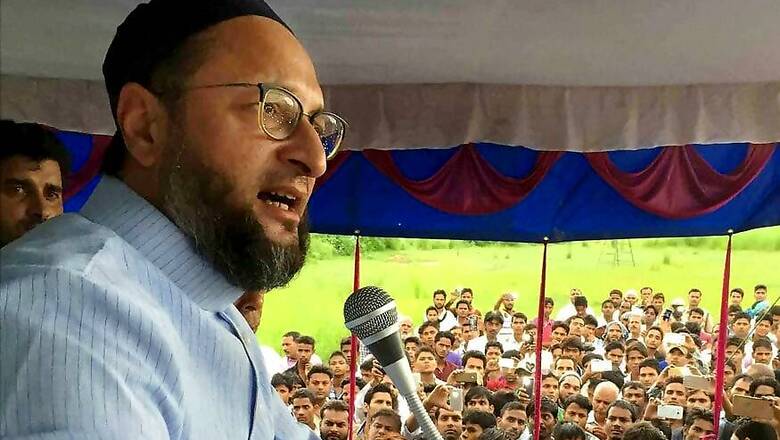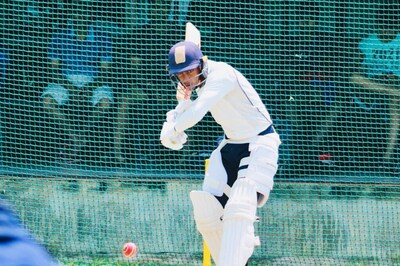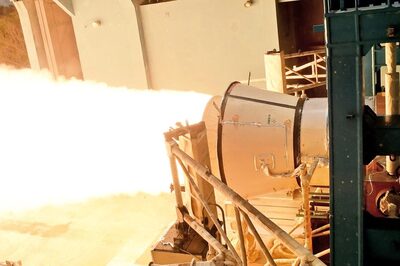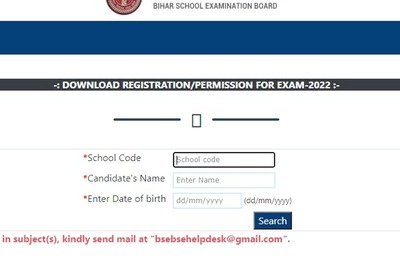
views
Despite the electoral disappointment in Uttar Pradesh, the idea of Dalit-Muslim unity continues to invoke debates across sections of society. As the nation celebrates Dr BR Ambedkar’s birth anniversary, Asaduddin Owaisi, the President of the All India Majlis-e-Ittehadul Muslimeen and Member of Parliament from Hyderabad, explains why he thinks Ambedkar is relevant to Muslims in India. Owaisi not only sees Ambedkar’s writings as a potent force against communalism, but also hopes for larger unity and fraternity between the two marginalized communities.
In the midst of Parliamentary elections in 2014, a section of society sparked a debate by suggesting that Dalit icon and author of India’s constitution, Dr BR Ambedkar did not trust Muslims. The dangerous effort to present the tallest leader and the fighter for a united and equalitarian India as anti-Muslim is still alive.
The constant onslaught in popular debates tried to project that Ambedkar viewed Indian Muslims negatively, and that this was deeply rooted in his dislike towards Islam or certain Muslim leaders of that time. The most problematic propagation was that Ambedkar’s essays titled, Pakistan or The Partition of India, were the proof that he did not view Indian Muslims positively.
Ambedkar, who built the agenda for inclusive society, much before others could even imagine such a thing for millions of downtrodden, feared and discriminated Muslims, has emerged as the tallest and most important figure in modern India.
The prime concern of the present debate arises at a time when the world is celebrating the 125th birth anniversary of Ambedkar. I view and understand Baba Saheb as the most prolific writer who never stopped working for the betterment of excluded sections of the Indian society. I also find Baba Saheb’s writings the most relevant for social development.
Perhaps, the writings and response to Ambedkar’s initiatives can be collected through the archival sources, mainly available in Urdu print media, and to some extent in Persian and English. The academic engagement on Ambedkar is vast but what needs a comprehensive and critical examination is — how Indian Muslims found his contribution useful for their development?
Certain political parties, including the ruling BJP, tried to counter Mayawati’s plan to bring Muslims (18 per cent of electorate) and Dalits (22 per cent of electorate) in Uttar Pradesh together to form a larger alliance of backward and marginalised communities. Mayawati’s agenda was that both Dalits and Muslims have suffered from pathetic living conditions since 1947, hence coming together would help this deprived group stand better in present scenario. It was in this background that Ambedkar has once again started figuring in political discussions, a kind of disguise to the innumerable contributions he made to the nation and its communities.
Ambedkar in his work, ‘Pakistan or Partition of India’, tries to examine the genuine predicaments of the Muslim minority in a predominantly Hindu society. He consciously critiqued the larger political spectrum to continue the rightist or Brahmanical hegemony in the society. Far from distrusting the Indian Muslims, Ambedkar says, “There are many lower orders in the Hindu society whose economic, political and social needs are the same as those of the majority of the Muslims and they could be far more ready to make a common cause with the Muslims than they would with high caste Hindus, who have denied and deprived them of ordinary human rights for centuries.”
Ambedkar further argues, “Is it not true that under the Montagu-Chelmsford Reforms, in most Indian provinces the Muslims, Non-Brahmins and Depressed classes united together and worked the reforms as members of one team from 1920 to 1937? Herein lies the most fruitful method of communal harmony among Hindus and Muslims and of destroying the danger of Hindu Raj”. So Ambedkar clearly sought lasting Dalit-Muslim unity.
On the question of caste, I see the assertion of Ambedkar that caste is not based on division of labour, rather it is a division of labourers. As an economic organisation also, caste is a harmful institution. He calls upon the Hindus to annihilate the caste, which is a great hindrance to social solidarity, and to set up a new social order based on the ideals of liberty, equality and fraternity in consonance with the principles of democracy. This would ultimately bring to construct social democracy in India. The fringe ideas are becoming the ideology of the Centre and this would suppress the premises for social democracy in India.
It is a wise step to revisit the draft on the safeguards for the minorities and Scheduled Castes that was submitted to the Constituent Assembly on behalf of the All-India Scheduled Castes Federation in 1946. It briefs several historical facts that have potential base to evolve Indian society as a nation of Dalit-Bahujan and Muslims. One can understand the envisioning the unity of Dalits and Muslims in India. Ambedkar wrote extensively for this cause. Different people are looking at this federation from different points of view. There is the point of view of the Princes. There is the point of view of the Hindus and the Muslims, and the Congress. There is also the point of view of the Merchants and the Traders. Each point of view is of course the result of their particular interests. The vision for Muslims who remained in India still proves Ambedkar’s understanding about the communities.
Ambedkar wrote that he had better plans for Muslims and wanted to draw attention of Muslims towards United India than opting for a separate province. “I claim that my plan is better than the plan of Pakistan. Let me state the points which tell in favour of my plan. They are: (i) Under my proposal the danger of a communal majority, which is the basis of Pakistan is removed, (ii) Under my proposal the weightage at present enjoyed by the Muslims is not disturbed. (iii) The position of Muslims in the Non-Pakistan Provinces is greatly strengthened by an increase in their representation, which they may not get if Pakistan comes and which will leave them in a more helpless condition than they are in at present.”
The anthropological and sociological writings lie largely on the concept of social structure in understanding of a society and for that matter a nation. As commonly understood, social structure refers to a systematic arrangement of parts or components of a society that is seen in the form of groups and sub-groups dependent on each other. Indian society is placed in hierarchical order than any other forms of structure with strong features of advantages and disadvantages in social rankings and privileges.
In this context, Muslims comprise of a community following monolithic religion Islam, which also advocates for an egalitarian social structure. Whereas I do see a huge number of Dalits aspiring for social justice and social democracy. The most important facets of Islam reflected due to its’ equalitarian agenda denouncing the existence of purity and pollution, pure and impure. Broadly, it rejected all forms of inequality based on caste, class, race and ethnicity in particular that could also connect the larger part of the Dalit-Bahujan.
Finally, I see the advancement of Sangh Parivar’s stratagem on Ambedkar, as appropriately put forth by Anand Teltumbde. He argues that in the first phase “the Hindutva forces hold against Amedkar’s powerful criticism of everything Hindu and sulked over his forsaking Hindu religion and embracing Buddhism. Realising that Ambedkar has symbolized the aspirations of the vast majority of Dalits in the country…. they adopted a strategy of co-opting Ambedkar. This strategy led to the launch of the Samajik Samrasata Manch (social assimilation platform) that provided space for willing sections of Dalits to be brainwashed by the Sangh Parivar.”
I, therefore, think that Baba Saheb is as much a leader of Muslims as that of Dalits. When I talk about Dalit-Muslim unity I am talking about that unity by keeping Ambedkar in the centrality of my premise.
Let me end with what Ambedkar said would happen if Hindu Raj became a reality — It is a menace to liberty, equality and fraternity. It is incompatible with democracy, it must be stopped at any cost.




















Comments
0 comment